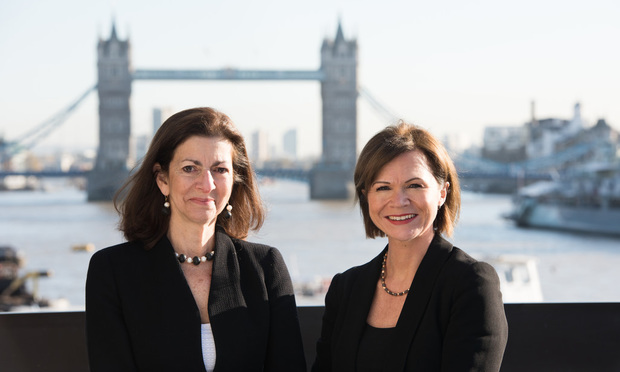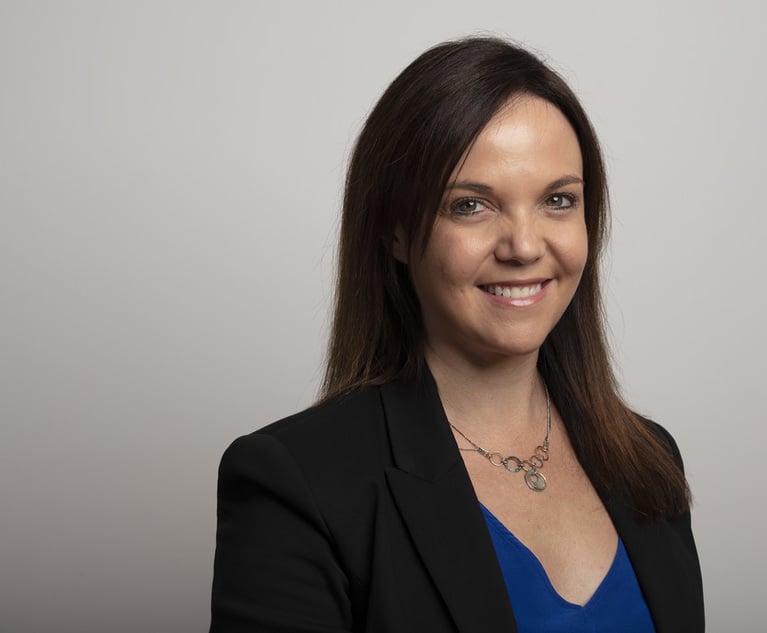Berwin no more: BLP partners vote through US merger to create Bryan Cave Leighton Paisner
UK and US firms seal fully financial integrated tie-up led by dual female leadership team
February 26, 2018 at 11:30 AM
6 minute read
 Therese Pritchard and Lisa Mayhew
Therese Pritchard and Lisa Mayhew
Berwin Leighton Paisner (BLP) and Bryan Cave have agreed to merge following a vote by partners to create a 1,600-lawyer transatlantic firm that will be among the 50 largest in the world, with combined revenues of around $900m (£640m).
The new firm, which will be called Bryan Cave Leighton Paisner, will be fully financially integrated, the firms said in a joint press release, suggesting they were able to overcome tax issues that had pushed back a vote on a proposed merger initially unveiled in mid-October.
In navigating the complexity of eschewing a Swiss verein style tie-up, both firms were advised by global accounting giant Deloitte.
The merger, which will go live in early April, combines two firms led by women, Bryan Cave's chair Therese Pritchard and BLP's managing partner Lisa Mayhew. The pair will be co-chairs of Bryan Cave Leighton Paisner, making it the first global firm to be led by two women, the firms said in their release.
They will oversee an organisation with offices in 32 cities across 11 countries, representing 191 clients in the Fortune 500 and 30 of the world's 50 largest banks by revenue.
"This merger will result in an expanded presence and set of service offerings in key markets around the world and accelerate our utilisation of technology and innovation to redefine efficiency and value in the practice of law," Pritchard said in a statement.
The decision to drop the Berwin name from the merged firm calls time on one of the best-known brands in City law, which, until recently, was part of the identity of two UK top 50 firms. Both SJ Berwin – which fell into administration last year after its 2013 merger with King & Wood Mallesons – and legacy BLP firm Berwin & Co were originally founded by storied City lawyer Stanley Berwin.
Bryan Cave and BLP have both been recognised for their innovative approaches to legal service delivery. Lawyers on Demand (LOD), the flexi-lawyering business launched by BLP partner Simon Harper in 2007, which the UK firm retains a 62% stake in, could be a differentiator for Bryan Cave's lawyers. While some US law firms have changed their staffing models on certain projects, none have a semi-captive business that would compare with LOD's 600-plus book of contract lawyers.
For its part, Bryan Cave's innovation efforts have included developing groups of data analysts, software programmers and project management professionals aimed at providing more efficient legal services. In 2016, the firm began offering those services to clients under a consulting brand called BCXponent led by chief innovation officer Kathryn DeBord in Denver and chief practice economics officer Christopher Emerson in St Louis.
"Clients will benefit from our combined legal expertise; our shared values and culture and our approach to innovation in their interests," said BLP's Mayhew in a statement. "Different to most other international firms, ours will be fully financially integrated from day one. This will enable us to work in teams whose only focus will be to provide a first class service to clients."
Pritchard had few details on the specific tax issues that caused the partnership vote to be delayed. While the firms knew they would have to take into consideration changes to the US tax code during the discussions, she said the new federal tax law did not have a major impact on the deal. She said the structure of the deal was "new enough" that both firms turned to Deloitte for advice on the tie-up.
A firm with revenues of $900m would have ranked 37th in the most recent Am Law 100 list and 44th in the Global 100 rankings, directly between McDermott Will & Emery and Milbank Tweed Hadley & McCloy in both tables. Bryan Cave, whose 2017 financial results have not yet been disclosed, posted revenues of $608m for 2016. BLP, meanwhile, took in £272m during 2016-17.
Elsewhere on the financial side, both firms have broadly similar profits per equity partner (PEP), with BLP posting PEP of £630,000 ($837,000) for 2016-17 and Bryan Cave having a similar figure of $865,000 (£656,000) for 2016.
The combined firm will have what Bryan Cave Leighton Paisner is calling the fourth-largest real estate practice among law firms. BLP recently opened its third UK office in Southampton, England, after hiring two real estate partners from Womble Bond Dickinson, the latter the product of another transatlantic union that closed late last year. Bryan Cave Leighton Paisner's M&A practice will rank in the top 20 of firms advising on US completed deals, according to Thomson Reuters data.
The union with Bryan Cave completes a goal of a US merger that BLP has pursued for some years. The UK firm held talks in early 2016 with Greenberg Traurig over a deal that would have created a 2,500-lawyer firm, before those discussions fell through amid reports of a clash in working cultures and vastly different compensation systems. Both BLP and Greenberg Traurig insisted their decision to part ways was mutual.
Bryan Cave has also previously found itself a bridesmaid in its bid to expand via merger. In late 2015, it was reportedly close to an acquisition of Dickstein Shapiro, but the then-struggling Washington DC-based firm backed away and instead struck a deal with Blank Rome. Bryan Cave also held unsuccessful merger talks in 2006 with what was then Squire Sanders & Dempsey.
Nonetheless, Bryan Cave has clinched several other smaller deals within the past decade. The firm absorbed Denver-based Holme Roberts & Owen in early 2012, Atlanta-based Powell Goldstein in 2009, New York-based Robinson Silverman Pearce Aronsohn & Berman in 2002 and Irvine, California-based Layman Jones & Dye in 1995.
Bryan Cave Leighton Paisner's formation occurs a week after Andrews Kurth Kenyon and Hunton & Williams agreed to merge into Hunton Andrews Kurth, a 1,000-lawyer firm with 15 offices throughout the U.S. and five elsewhere around the world. The New York Law Journal reported in December that the number of transformational law firm mergers have been on the rise as a result of heightened competition and stratification in the legal industry.
This content has been archived. It is available through our partners, LexisNexis® and Bloomberg Law.
To view this content, please continue to their sites.
Not a Lexis Subscriber?
Subscribe Now
Not a Bloomberg Law Subscriber?
Subscribe Now
NOT FOR REPRINT
© 2025 ALM Global, LLC, All Rights Reserved. Request academic re-use from www.copyright.com. All other uses, submit a request to [email protected]. For more information visit Asset & Logo Licensing.
You Might Like
View All
Goodwin's Singapore Private Equity Partner Leaves to Join Key Client Hillhouse Investment


Trending Stories
- 1Courts Demonstrate Growing Willingness to Sanction Courtroom Misuse of AI
- 2The New Rules of AI: Part 1—Managing Risk
- 3Change Is Coming to the EEOC—But Not Overnight
- 4Med Mal Defense Win Stands as State Appeals Court Rejects Arguments Over Blocked Cross-Examination
- 5Rejecting 'Blind Adherence to Outdated Precedent,’ US Judge Goes His Own Way on Attorney Fees
Who Got The Work
J. Brugh Lower of Gibbons has entered an appearance for industrial equipment supplier Devco Corporation in a pending trademark infringement lawsuit. The suit, accusing the defendant of selling knock-off Graco products, was filed Dec. 18 in New Jersey District Court by Rivkin Radler on behalf of Graco Inc. and Graco Minnesota. The case, assigned to U.S. District Judge Zahid N. Quraishi, is 3:24-cv-11294, Graco Inc. et al v. Devco Corporation.
Who Got The Work
Rebecca Maller-Stein and Kent A. Yalowitz of Arnold & Porter Kaye Scholer have entered their appearances for Hanaco Venture Capital and its executives, Lior Prosor and David Frankel, in a pending securities lawsuit. The action, filed on Dec. 24 in New York Southern District Court by Zell, Aron & Co. on behalf of Goldeneye Advisors, accuses the defendants of negligently and fraudulently managing the plaintiff's $1 million investment. The case, assigned to U.S. District Judge Vernon S. Broderick, is 1:24-cv-09918, Goldeneye Advisors, LLC v. Hanaco Venture Capital, Ltd. et al.
Who Got The Work
Attorneys from A&O Shearman has stepped in as defense counsel for Toronto-Dominion Bank and other defendants in a pending securities class action. The suit, filed Dec. 11 in New York Southern District Court by Bleichmar Fonti & Auld, accuses the defendants of concealing the bank's 'pervasive' deficiencies in regards to its compliance with the Bank Secrecy Act and the quality of its anti-money laundering controls. The case, assigned to U.S. District Judge Arun Subramanian, is 1:24-cv-09445, Gonzalez v. The Toronto-Dominion Bank et al.
Who Got The Work
Crown Castle International, a Pennsylvania company providing shared communications infrastructure, has turned to Luke D. Wolf of Gordon Rees Scully Mansukhani to fend off a pending breach-of-contract lawsuit. The court action, filed Nov. 25 in Michigan Eastern District Court by Hooper Hathaway PC on behalf of The Town Residences LLC, accuses Crown Castle of failing to transfer approximately $30,000 in utility payments from T-Mobile in breach of a roof-top lease and assignment agreement. The case, assigned to U.S. District Judge Susan K. Declercq, is 2:24-cv-13131, The Town Residences LLC v. T-Mobile US, Inc. et al.
Who Got The Work
Wilfred P. Coronato and Daniel M. Schwartz of McCarter & English have stepped in as defense counsel to Electrolux Home Products Inc. in a pending product liability lawsuit. The court action, filed Nov. 26 in New York Eastern District Court by Poulos Lopiccolo PC and Nagel Rice LLP on behalf of David Stern, alleges that the defendant's refrigerators’ drawers and shelving repeatedly break and fall apart within months after purchase. The case, assigned to U.S. District Judge Joan M. Azrack, is 2:24-cv-08204, Stern v. Electrolux Home Products, Inc.
Featured Firms
Law Offices of Gary Martin Hays & Associates, P.C.
(470) 294-1674
Law Offices of Mark E. Salomone
(857) 444-6468
Smith & Hassler
(713) 739-1250









